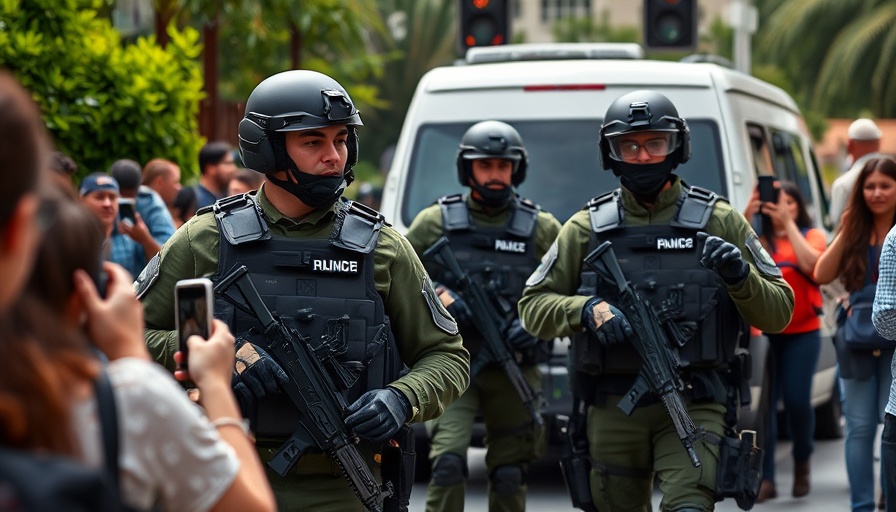
Immigration Raid Unfolds in San Diego: A Disturbing Scene
In a recent immigration raid at the Buona Forchetta restaurant in San Diego, chaos erupted as federal agents executed a criminal search warrant, leaving the local community shaken and raising critical questions around immigration enforcement tactics. Videos captured by bystanders show armed agents, masked and in tactical gear, swarming the scene, a clear image of the intense measures taken by authorities in their crackdown on undocumented immigrants.
What Happened During the Raid?
On a Friday afternoon, patrons reported hearing tumultuous noise as a significant number of agents surrounded the popular Italian establishment just before its scheduled opening. Witnesses revealed that the agents handcuffed restaurant staff while demanding identification, a sight that prompted shock and anger from surrounding crowds who mobilized quickly to express their outrage. As tensions escalated, agents appeared to deploy a smoke device that filled the air with smoke, leading some protesters to fear for their safety, exacerbating an already fraught atmosphere.
The Community's Response: Outrage and Solidarity
The response from the San Diego community was immediate and loud; records indicate that dozens gathered to protest what they deemed an aggressive show of force against the restaurant workers and patrons alike. The crowd shouted profanities and criticized the agents, comparing their tactics to those of fascist regimes. Local leaders and activists quickly voiced solidarity with the employees of Buona Forchetta, citing concerns over the implications of such raids not only on the affected individuals but also in stoking fears within immigrant communities.
Implications for Immigration Policy and Community Sentiments
This unsettling incident has caused many to reflect on the broader implications of U.S. immigration policies under the current administration. With President Trump’s pledge to increase deportation efforts, critics argue that such actions are part of a larger narrative of criminalization and fear tactics aimed at immigrant communities. The atmosphere of fear generated by these types of raids can silence vulnerable populations, potentially leading to their withdrawal from community participation and support systems.
Legal Perspectives: Rights of Workers and Implications of Raids
From a legal standpoint, workplace raids raise important questions about the rights of workers and the protections they have in these environments. Legal experts argue that many employees may not fully understand their rights when confronted by agents, leading to potential violations and unjust treatment. Moreover, communities are encouraged to engage with local leaders and legal advocates to educate themselves and prepare better responses in future situations.
The Role of Law Enforcement: Federal vs. Local Dynamics
This raid also highlights the complex relationship between federal and local law enforcement agencies. The San Diego Police Department reported that they were called to assist but arrived after agents had already left the scene, emphasizing the independence with which federal agencies like ICE operate. This can create tension in communities where local law enforcement is seen as unsympathetic to the plight of immigrants, fueling divisions and concerns about policing practices.
The Future of Immigration Raids: What Lies Ahead?
As discussions around immigration continue to evolve in response to such events, the national conversation must include the human element of these policies—the workers, families, and communities directly affected. Moving forward, it is essential for policymakers to engage with local communities and advocacy groups to ensure that laws and practices are fair and just, potentially positioning the community's needs at the center of immigration reform discussions.
Understanding how immigration raids affect local sentiment can ultimately inform better practices and humane policies. With community outrage and support systems strengthening, the opportunity to present a united front against such aggressive tactics is front and center.
The impact of these scenes will undoubtedly persist in San Diego and beyond, stirring conversations about rights, justice, and humanity in American immigration policy. Engaging with local leaders and staying informed on these developments will be key for those advocating for a more compassionate approach to immigration reform.
 Add Row
Add Row  Add
Add 




 Add Row
Add Row  Add
Add 

Write A Comment